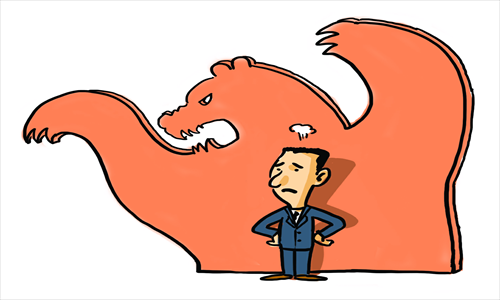Pessimistic media portrayal of Beijing mirrors national sensitivities in West

Illustration: Liu Rui/GT
Why should someone study the media and pay systematic attention to their coverage? This is a common question asked by analysts and scholars in the field of communications. The main answer is that it is all about power: the power to inform and to create images, perceptions, tendencies and realities.
In that regard, it is interesting to examine how the relative slowdown of the economy of China has been analyzed in Chinese and Western media.
On the one hand, Chinese media tend to see the slowdown as a natural phenomenon stemming from efforts made by Beijing to gradually change its economic model.
From their point of view, perspectives for the future are stable and certainly positive, as the country experiences a transition period from being based on exports to focusing more on domestic consumption.
On the other hand, Western media follow a completely different approach. According to their position, the slowdown of the Chinese economy is a clear sign that the country will soon face serious problems due to its poor performance.
The website of CNN, for instance, attempts to elaborate on the question whether it will crash and collapse in the near future. Additionally The Economist used the term "The Great Deceleration" to portray developments affecting not only China but also other emerging economies, namely Russia, Brazil and India, all members of the BRICS.
News, facts and events do not have a voice to speak for themselves. Therefore, slanting on the part of journalists is almost unavoidable. This is also the case with the recent announcement regarding China's growth rate, which now stands at 7.5 percent.
The contrasting arguments presented in the discourse of Chinese and Western media should not be considered as occasional or random responses. They do rather reflect the competing philosophies of two different worlds.
The lack of knowledge on the other side constitutes an important factor explaining why disagreements are found in the media coverage. In spite of expanding expertise in recent years in American, European and Chinese studies respectively, there is still a long way to go for knowledge gaps to be fully filled.
In theory, a better understanding can be facilitated if regular exchange programs between journalists can be organized. This will give them the opportunity to establish contacts, acquire more sources, work collaboratively and cross-check background information they provide to their audiences.
But the current contrasting perceptions cannot only be deemed as being the result of different journalistic practices in China and the West. They do principally mirror strong national sensitivities, if not ideologies.
As long as a fast-growing minority of political and economic elites regard each other with suspicion, it is not surprising that journalists will follow and reproduce this tendency.
Although all views expressed in the media discourse are respectable, Western journalists seem to take an exaggerated approach. This observation can be justified for two main reasons.
First, it is not fair to criticize the relative slowdown of the Chinese economy without openly admitting that the US is still struggling to recover while the eurozone is sinking back into recession.
And second, it is illogical to argue that an economy would - year after year - be able to keep the same growth pace and preserve double-digit rates, deliberately forgetting that its GDP has been continuously increasing since 1980, according to World Bank data.
Apart from an analysis of the stance of journalists, what matters more now is its effect. Irrespective of their deeper motivations, Western media do systematically construct the image of China as that of a country faced with important difficulties and obstacles, gradually losing the strength of previous years and facing the risk of a full-fledged crisis.
Chinese policymakers should not be surprised. Public diplomacy and communication strategy are useful tools as long as the antagonism between Beijing and Washington becomes more apparent in international politics.
Maybe the best way to respond is by employing the same method. Within the framework of a lively and flourishing debate where different views are democratically presented and promoted, China can emphasize more carefully the spread of its ideas worldwide.
The rise of Chinese media branches abroad, for instance, demonstrates a significant step in China's will to play a bigger role in the global media environment.
The negative construction of its image following the recent announcement of its growth can actually lead to a chorus promoting additional initiatives and the formation of a more active communications strategy.
The author is a research fellow at the Hellenic Foundation for European and Foreign Policy. opinion@globaltimes.com.cn